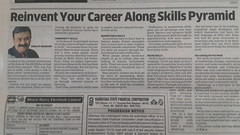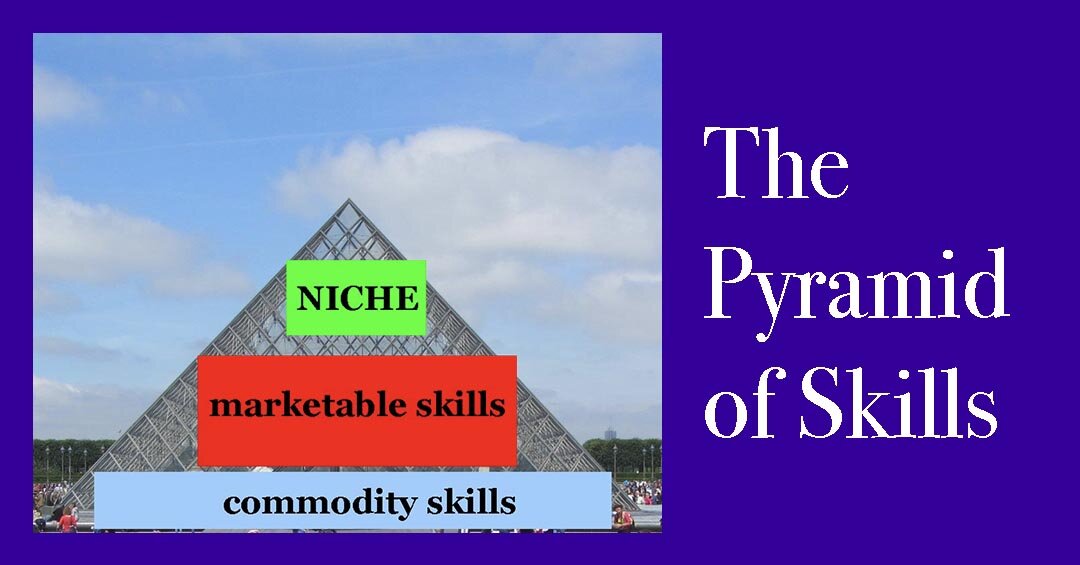 I looked at the puzzled expressions on the faces of the 200 MBAs we had hired from the campus. This was day one at work. I was going to talk to them about “reinventing careers”. Isn’t it too early to think about reinvention on the first day at work, they ask me?Careers are not built on aspirations. Not anymore. They are built around the portfolio of skills we have. Think of all the skills you have as represented by a pyramid.COMMODITY SKILLS: At the base of the pyramid, we have skills that can be termed as Commodity Skills. These are skills you possess but cannot put them in your resume. Like what? Telling people that you know how to use a mobile phone… OK on a serious note, there was a time when people would proudly mention that they were proficient in Word, Excel and PowerPoint. Today we simply expect people to have these skills. Having them is not an advantage. But not having them can be a limitation. You certainly never list them on your resume. Finally, the commodity skills don’t need you to go to a certified instructor. They are skills we pick up through informal sources of learning. Over time the commodity skills cease to matter and are replaced by Marketable Skills.
I looked at the puzzled expressions on the faces of the 200 MBAs we had hired from the campus. This was day one at work. I was going to talk to them about “reinventing careers”. Isn’t it too early to think about reinvention on the first day at work, they ask me?Careers are not built on aspirations. Not anymore. They are built around the portfolio of skills we have. Think of all the skills you have as represented by a pyramid.COMMODITY SKILLS: At the base of the pyramid, we have skills that can be termed as Commodity Skills. These are skills you possess but cannot put them in your resume. Like what? Telling people that you know how to use a mobile phone… OK on a serious note, there was a time when people would proudly mention that they were proficient in Word, Excel and PowerPoint. Today we simply expect people to have these skills. Having them is not an advantage. But not having them can be a limitation. You certainly never list them on your resume. Finally, the commodity skills don’t need you to go to a certified instructor. They are skills we pick up through informal sources of learning. Over time the commodity skills cease to matter and are replaced by Marketable Skills. MARKETABLE SKILLS: Accountants have to learn how to balance books. Project managers have to learn how to steer complex projects towards completion. These are the skills that we acquire through formal education and certification. When people attend vocational classes or go to college they are looking to acquire mainstream skills. There are many providers of these mainstream skills. There is a definitive structured way to learn these skills. Most people’s careers are built on the basis of the mainstream skills. When employers write a job description they are looking for these skills as the core of what the candidate will be expected to do. Proficiency in mainstream skills is an advantage over peers. Doctors and surgeons build their professional skills through an apprenticeship with more experienced doctors and surgeons. Over time the Marketable Skills do not provide a differentiator. That comes from the Niche Skills.NICHE SKILLS: Swift is Apple’s new programming language, which has been in development for the past four years and is all set to replace Objective-C as the main language for app development on Apple’s platforms, OSX and iOS. How will people learn this new language? Apple has published a guide that will serve as a starting point for others to start. Through trial and error, early enthusiasts will sharpen their skills and will start releasing “how to” videos and blog posts. Learning a niche skill is not always as organized and structured. Yet, in a fast changing world, the people with niche skills have a distinct advantage. But not every one of the 9 million registered Apple developers will reskill themselves and learn the new language on their own. Some will wait for more structured instructions and courses to be developed before they can learn and some will never make the transition at all.(Update: Apple gives free App Development curriculum to schools in May 2017. So in three years the skill moved from Niche to Marketable)
MARKETABLE SKILLS: Accountants have to learn how to balance books. Project managers have to learn how to steer complex projects towards completion. These are the skills that we acquire through formal education and certification. When people attend vocational classes or go to college they are looking to acquire mainstream skills. There are many providers of these mainstream skills. There is a definitive structured way to learn these skills. Most people’s careers are built on the basis of the mainstream skills. When employers write a job description they are looking for these skills as the core of what the candidate will be expected to do. Proficiency in mainstream skills is an advantage over peers. Doctors and surgeons build their professional skills through an apprenticeship with more experienced doctors and surgeons. Over time the Marketable Skills do not provide a differentiator. That comes from the Niche Skills.NICHE SKILLS: Swift is Apple’s new programming language, which has been in development for the past four years and is all set to replace Objective-C as the main language for app development on Apple’s platforms, OSX and iOS. How will people learn this new language? Apple has published a guide that will serve as a starting point for others to start. Through trial and error, early enthusiasts will sharpen their skills and will start releasing “how to” videos and blog posts. Learning a niche skill is not always as organized and structured. Yet, in a fast changing world, the people with niche skills have a distinct advantage. But not every one of the 9 million registered Apple developers will reskill themselves and learn the new language on their own. Some will wait for more structured instructions and courses to be developed before they can learn and some will never make the transition at all.(Update: Apple gives free App Development curriculum to schools in May 2017. So in three years the skill moved from Niche to Marketable) Disrupting the PyramidThe skills pyramid is never static. As technology changes, regulations evolve, some of the commodity skills become obsolete and irrelevant. What was once considered to be a marketable becomes commoditized very soon. Yesterday’s niche skills are today’s marketable skills and tomorrow’s commodity skills. Technology is a disruptor in the skills market. Think of the number of professions that have been disrupted by the mobile phone. Every new product or service that is launched creates another shuffle of the skills pyramid and renders some marketable skills obsolete or at best commoditized where it is impossible to get paid for having those skills.Being able to learn new skills constantly is an important element of success in today’s world. This is not a skill most people have been used to building.———–Written for The Economic Times dated 5th August 2014Work need not be a chore <here’s how>Join me on Twitter @AbhijitBhaduri
Disrupting the PyramidThe skills pyramid is never static. As technology changes, regulations evolve, some of the commodity skills become obsolete and irrelevant. What was once considered to be a marketable becomes commoditized very soon. Yesterday’s niche skills are today’s marketable skills and tomorrow’s commodity skills. Technology is a disruptor in the skills market. Think of the number of professions that have been disrupted by the mobile phone. Every new product or service that is launched creates another shuffle of the skills pyramid and renders some marketable skills obsolete or at best commoditized where it is impossible to get paid for having those skills.Being able to learn new skills constantly is an important element of success in today’s world. This is not a skill most people have been used to building.———–Written for The Economic Times dated 5th August 2014Work need not be a chore <here’s how>Join me on Twitter @AbhijitBhaduri
—
Written By
The Skills Pyramid
Comments
7 responses to “The Skills Pyramid”
-
The article was quite thought provoking and very insightful, it re-inforces the need for continuous up gradation of skills which is prudent in the competitive world where its the “Survival of Fittest”
-
wow! such an amazing read…thanks for writing on this subject.
-
A very refreshing and insightful take on building careers. It is indeed an ongoing journey and one needs to work hard to stay relevant. Technology can lead to great disruptions but with every disruption begins a new opportunity. Thanks.
-
Ravinder, Gayatri and HargovindThanks for stopping by.Technology is a double edged sword. At one level it makes our life easier and then again it seeks to shave off a slice of the platform on which we have built careers.
-
Interesting read – especially because it provides me with a ‘framework’ to look back at my “aimless”, 17+ year career 🙂 .I realise now that I have acquired a broad range of skills from my peripatetic work experience.I need to forget the commoditised ones, ‘sell’ my marketable ones acquire some ‘niche’ ones. All in a continuous, non-stop flow.Thanks!
-
Hi,Apart from the official mailers, I today explored your blog.You are one inspiring person with somehow makes me feel that you got more than 24hrs a day.I am curious to know, how do you manage time? Have you already written one on this subject?
-
RakeshI love writing. So I try to write regularly. Thats all.That seems to create the illusion :)Thanks for reading my workRegardsAbhijit
-



Leave a Reply